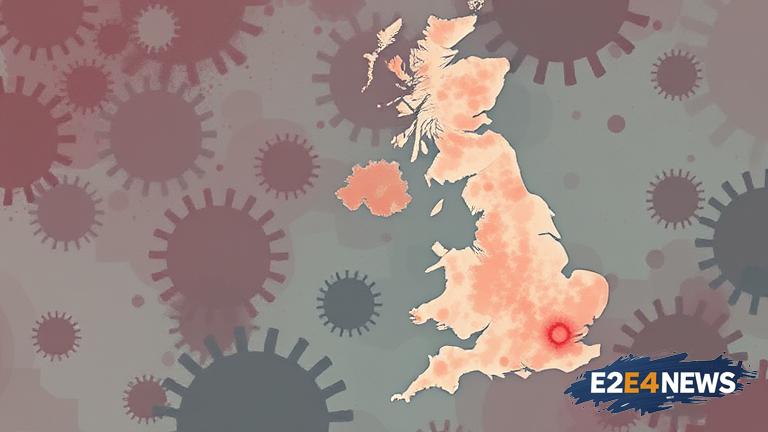The UK is experiencing a significant rise in respiratory syncytial virus (RSV) cases, with health officials issuing a warning to parents and caregivers to be aware of the symptoms. RSV is a common and highly contagious virus that affects people of all ages, but it is most severe in young children and older adults. The virus can cause mild, moderate, or severe illness, and in some cases, it can lead to serious complications such as bronchiolitis and pneumonia. According to the UK Health Security Agency (UKHSA), there has been a notable increase in RSV cases in recent weeks, with the majority of cases reported in children under the age of five. The UKHSA has warned that the rise in cases is likely due to the easing of COVID-19 restrictions and the increased mixing of people. Parents and caregivers are advised to be vigilant for symptoms of RSV, which can include a runny nose, coughing, sneezing, and fever. In severe cases, RSV can cause wheezing, difficulty breathing, and a decrease in appetite. The virus is highly contagious and can be spread through close contact with an infected person, as well as through touching contaminated surfaces. The UKHSA has advised parents to take precautions to prevent the spread of RSV, such as washing hands frequently, avoiding close contact with anyone who is sick, and keeping surfaces clean. The warning comes as the UK enters the winter season, which is typically the peak time for RSV cases. The virus can have a significant impact on young children, particularly those under the age of two, who are at higher risk of developing severe illness. In some cases, RSV can require hospitalization, and in rare cases, it can be life-threatening. The UKHSA has emphasized the importance of seeking medical attention if symptoms persist or worsen over time. Parents and caregivers are also advised to seek medical attention if they notice any signs of severe illness, such as difficulty breathing or a decrease in appetite. The rise in RSV cases has also sparked concerns about the potential impact on the NHS, which is already under pressure due to the COVID-19 pandemic. The UKHSA has advised parents to take precautions to prevent the spread of RSV and to seek medical attention if they have any concerns. The warning has been issued as part of a wider effort to raise awareness about the risks of RSV and to promote preventive measures. The UKHSA has also emphasized the importance of vaccination, particularly for high-risk groups such as young children and older adults. The warning has been welcomed by health experts, who have emphasized the need for vigilance and preventive measures to mitigate the spread of RSV. The UKHSA will continue to monitor the situation and provide updates as necessary. In the meantime, parents and caregivers are advised to remain vigilant and to take precautions to prevent the spread of RSV. The rise in RSV cases is a reminder of the importance of staying informed and taking preventive measures to protect against infectious diseases. By taking simple precautions such as washing hands frequently and avoiding close contact with anyone who is sick, individuals can help to prevent the spread of RSV and other infectious diseases. The UKHSA will continue to work closely with healthcare professionals and other stakeholders to promote awareness and preventive measures. The warning has also sparked a wider debate about the need for greater awareness and education about infectious diseases, particularly among parents and caregivers. The UKHSA has emphasized the importance of staying informed and taking preventive measures to protect against infectious diseases. The rise in RSV cases is a reminder of the importance of vigilance and preventive measures, particularly during the winter season when infectious diseases are more prevalent.





